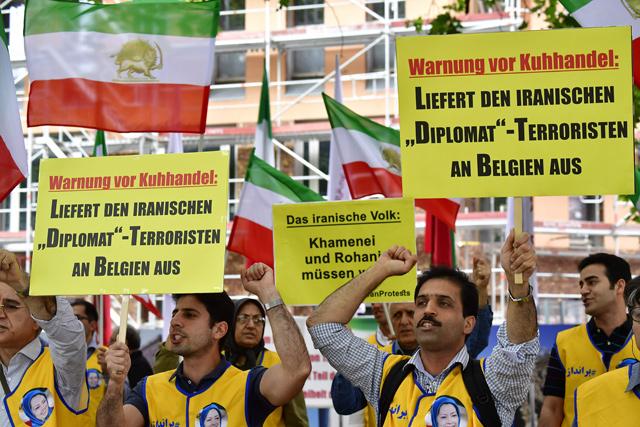You are here
Concerns Iranian ‘terrorist’ diplomat could be repatriated
By AFP - Jul 04,2022 - Last updated at Jul 04,2022
BRUSSELS — Concerns are being voiced in Belgium that an Iranian diplomat serving a 20-year sentence for plotting a bomb attack outside Paris could be repatriated in a possible prisoner swap.
An opposition MP and lawyers for a dissident Iranian group said a bilateral Belgium-Iran treaty due to be voted on this week would pave the way for Assadollah Assadi, convicted of terror charges and sentenced in February 2021, to be sent home.
The treaty’s text “is tailored to Mr Assadi”, said the MP, Georges Dallemagne.
He predicted the Belgian government would present any release of Assadi as a “humanitarian operation”, a trade for a Swedish-Iranian academic, Ahmadreza Djalali, who is being held in Iran under sentence of death. Djalali taught at a Brussels university.
The matter has also caught the attention of US lawmakers.
One, Randy Weber, a Republican representative in Texas, tweeted he was “shocked to find out that the Belgian government has cut a deal with the world’s leading state-sponsor of terrorism & plans to send Iranian terrorists back to Iran to plot more terroristic acts”.
He called on other congressmen and women to join him in raising the alarm over the treaty text before the Belgian parliament.
Contacted by AFP, a spokesman for Belgian Justice Minister Vincent Van Quickenborne said “there is no connection with Mr Djalali’s case”.
He added that the minister would “explain his point of view” to parliament on Tuesday. The spokesman declined to give further details.
Assadi was found guilty of supplying explosives for a planned June 30, 2018 bomb attack on an event outside Paris held by the dissident National Council of Resistance in Iran (NCRI) group.
Belgian police thwarted the 2018 attack when they intercepted a car carrying the bomb, acting on information gathered by several European intelligence services.
No diplomatic immunity
Attached to Iran’s embassy in Austria, Assadi was arrested in Germany where his claim for diplomatic immunity was denied.
Investigators who conducted a two-year probe determined he was an Iranian agent working under diplomatic cover. The Belgian court convicted him of attempted “terrorist” murder and “participating in the activities of a terrorist group”.
Assadi’s sentence was upheld in May 2021 when he opted not to appeal. Tehran has protested his conviction.
The NCRI, whose core is made up of a militant organisation known as the MEK, was a civil party in Assadi’s trial. Its lawyers said the treaty was designed to allow Assadi to go back to Iran.
A copy of the treaty obtained by AFP showed it was signed on March 11 by the Belgian justice ministry and the Iranian ambassador to Belgium.
It says that “the best way” to boost cooperation with Iran in justice matters was to allow convicts to serve out their sentences in their home countries.
It also allows that each jurisdiction might pardon the returned convicts or commute their sentences.
Debate on the treaty was to start on Tuesday, with the full parliament to vote whether to adopt it on Thursday.
The controversy in Belgium over the text was happening at a time that European powers were trying to bring Iran and the United States back into compliance with a 2015 nuclear deal.
That pact, badly weakened when then-president Donald Trump pulled America out in 2018, is largely moribund. Iran has leapt ahead with its uranium enrichment to a level putting it close to the point where it could produce nuclear weapons.
Talks last week in Qatar failed to produce a breakthrough, with Iran in particular said to be holding fast to a new demand that its Islamic Revolutionary Guard Corps be taken off a US terror list.
Related Articles
BRUSSELS — An Iranian diplomat's 20-year sentence in Belgium for plotting to bomb an opposition rally outside Paris was confirmed on Wednesd
BRUSSELS — Iran has been holding a Belgian man for the past four months under trumped-up “espionage” charges, Belgium’s justice minister sai
BERLIN — German prosecutors said on Wednesday a court had remanded in custody an alleged Iranian spy accused of plotting to bomb an Iranian

















